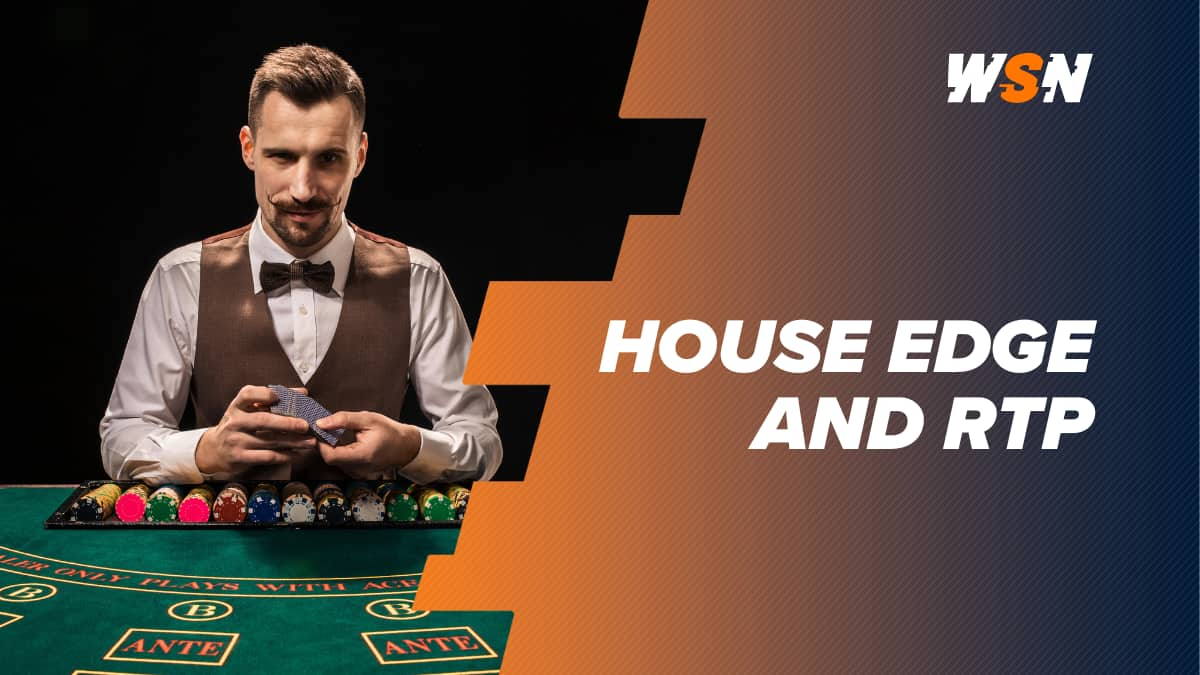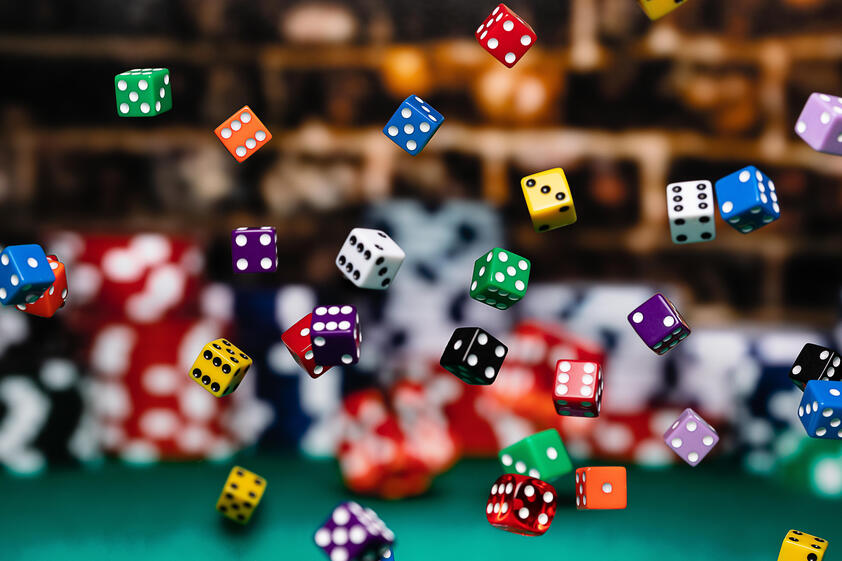You might have heard of house edge in casino gaming, but you probably didn’t know the numbers aren’t always relevant. I’m not saying house edge and the closely related RTP values aren’t important. They are.
However, there’s a crucial point that people often miss when it comes to casino house edge. I don’t want you to miss this point, which is why I’ve poured my 10+ years of experience into this guide.
What is house edge in casino gaming? Here’s the honest answer.

House edge and Return to Player (RTP) are two sides of the same coin. Both figures refer to your advantage or disadvantage in a casino game. Before I dive a little deeper into the relationship between house edge and RTP, let’s set the scene by defining these terms:
House edge is the expected average loss compared to an initial bet. For example, let’s say the house edge is 2%. That means the expected average loss that should be applied to an initial bet is 2%. For example, your expected loss from a $10 bet is $2 if the game has a 2% house edge.
TL;DR = House edge is the casino’s advantage/your disadvantage expressed as a percentage.
The standard RTP casino meaning used by gambling companies refers to the expected return for a game. For example, if a casino game’s RTP is 98%, the expected overall return is $98 for every $100 wagered.
TL;DR = RTP is the return you can expect over the long term.
House edge and RTP both refer to a casino operator’s advantage. Basically, they’re the same figure expressed in two different ways. That means you can use either number to determine your expected win/loss rate.
If the house edge is 2%, that means the RTP is 98%. If the RTP is 95%, that means the house edge is 5%. Whichever figure you focus on, use it as a measure of what you can expect to win/lose by wagering $100.
I’m not saying you need to wager $100, but this makes the math easier. So, if you wager $100 in a 1% house edge game (i.e., a 99% RTP game), the expected return is $99. Wager the same amount in a 5% house edge game, and the expected return drops to $95.
No. In fact, it’s quite the opposite. Having defined parameters ensures that casino games are fair. Let’s say the house edge for blackjack is set at 1%. We can get a computer program to perform a Monte Carlo simulation (i.e., play millions of hands) to test the house edge.
If the house edge is greater than expected, the game might be rigged. This is the type of test companies such as eCOGRA and GLI perform. These independent third parties test an online casino’s software to ensure that games fall within expected statistical ranges and are fair.
Therefore, house edge is a necessary part of casino gaming. Yes, it’s true that casino operators have a slight advantage, but that’s the nature of gambling. No one is trying to hide this fact because it’s not cheating.
Everyone knows the rules of play, which is why online casino games are fair. It’s also why knowing the meaning of house edge and the values for each game can help you make smarter decisions.
Casino house edge is calculated for you, so don’t worry about performing complex equations if you’re not mathematically minded. That being said, it’s useful to know how house edge is calculated so you can understand the crucial difference between expectation and reality.
Here’s how to calculate house edge using a simple dice game with a 4:1 payout:
A standard die has six possible outcomes (1 to 6). This means that the probability of any number hitting is 1/6. Expressed as odds, you’ve got a 5:1 chance of picking the right number (i.e., there are five incorrect outcomes vs. one correct outcome).
From this, we can calculate the house edge using this equation:
(true odds − payout odds) / (true odds + 1)
So, in this game, the true odds are 5/1, and the payout odds are 4/1:
(5 − 4) / (5 + 1) = 0.166
We can multiply this number by 100 to give us a percentage:
The house edge for our dice game is 16.66%. That means we can expect to lose, on average, $16.66 for every $100 wagered.
The concept that most people get wrong when they first learn about house edge is expectation vs. reality. I can’t tell you how many times I’ve heard people say the following:
“So that means I’m going to lose $X every time I place a bet?”
No. You do lose money each time you bet if the casino operator has an edge. However, this loss is theoretical. To get technical for a moment, you’re losing expected value (EV) on each bet.
Importantly, however, the expected value of your bet is a long-term projection, i.e., it’s how much you expect to win/lose over a long period of time, based on the sum total of your wins and losses. This means it’s possible to win or lose in any given scenario.
Let’s say the EV of a game is -$1. This tells us that we’ll end up with a $1 loss if we play a sufficient number of hands. What it doesn’t tell us, though, is how our results will fluctuate until we get to that point. We might have 50 winning hands in a row. In math, these fluctuations are known as variance.
That’s what I mean by expectation vs. reality. You will lose money over time if the casino has an edge. However, the road to that expected outcome is full of twists and turns. These twists and turns are wins and losses. That’s why it’s possible to have winning sessions.
Even more comforting is the fact that house edge and EV are calculated over millions of trials (i.e., bets). You could go on a hot streak and win 100 sessions in a row. In fact, you might not ever get close to the true EV of a game.
So, while it would be nice if the house didn’t have an edge, it doesn’t mean you’re destined to lose. Winning streaks are not only possible but expected in casino gaming.

Now that you know what house edge is and the impact it has, you’re probably wondering what the numbers are. Every casino game has its own house edge. That’s why smart gamblers gravitate toward casino games with the lowest house edge.
Why? Because you have a better theoretical chance of winning. To pick up on my previous point, you’re more likely to hit a winning streak if the house edge is 1% rather than 5%. With this in mind, here’s the house edge for every popular casino game online:
| Casino Game | House Edge |
|---|---|
| House Edge for Blackjack | 0.28% to 2% (based on your betting strategy) |
| House Edge for Baccarat | 1.06% (Banker Bet), 1.24% (Player Bet), 14.36% (Tie) |
| House Edge for Roulette | 2.70% (European Single Zero Game), 5.26% (American Double Zero Game) |
| House Edge for Casino Poker | Between 0.46% (Video Poker) and 10% (Pick’em Poker) |
| House Edge for Craps | Between 0% and 16.67% (based on the bet you make) |
| House Edge for Sic Bo | Between 2.78% and 33.33% |
| House Edge for Slot | Between 1% and 15% |
You’ll notice that the house edge often depends on the bets you make. Something else to note is that slot games have an added variable known as volatility. This rating determines how often, on average, prizes are paid out.
A high-volatility slot pays less often than a low-volatility slot. But, by the same token, prizes have a higher average value in high-volatility slots than they do in low-volatility slots.
Based on the numbers above, here are five casino games with the lowest house edge:
Blackjack (0.28% if you play optimal strategy)
Video poker (0.46% if you play optimal strategy)
Baccarat (1.06% if you bet on the Banker)
Craps (0% if you make Odds bets – note that your max wager is limited for these bets)
Slots (1% if you play games with a 99% RTP)
You can beat the house edge in one instance, and that’s if you know how to count cards in blackjack. If you can’t do that, the casino house edge is something you have to live with. The positive, however, is that variance allows us to have winning sessions.
Therefore, even if a casino operator has an overall advantage, we can still come out ahead in any given session. That’s what makes casino games exciting, and it’s the reason why we can still bank some cash, even though the house has an edge.
I said earlier that variance gives us a chance to have winning sessions. The best way to let variance do its thing is to bet responsibly. By that, I mean only risking small amounts relative to your bankroll.
Doing this can help minimize your losses. This allows you to remain active for longer, which, in turn, gives you a better shot at going on a winning run. Check out our guide to responsible gambling for more tips on how to manage your money and emotions.
If you or someone you know is struggling, don't hesitate to reach out to the nationally available help channels.
/fit-in/400x235/1750328100/a-beginner%E2%80%99s-guide-to-casino-progressive-jackpots.jpg)
A Beginner’s Guide to Casino Progressive Jackpots
7 months ago | Daniel Smyth/fit-in/400x235/1750333797/online-casino-slot-paylines-explained.jpg)
Online Casino Slot Paylines Explained: How to Turn Spins into Wins
6 months ago | Daniel Smyth/fit-in/400x235/1750322418/how-to-play-slots-at-online-casino.jpg)
How to Play Slots: A Beginner’s Guide to Spinning Smart
7 months ago | Bezaleel-Akinbami
We support responsible gambling. Gambling can be addictive, please play responsibly. If you need help, call 1-800-Gambler, players in Washington to contact 1-800-547-6133.
WSN.com is managed by Gentoo Media. Unless declared otherwise, all of the visible content on this site, such
as texts and images, including the brand name and logo, belongs to Innovation Labs Limited (a Gentoo Media
company) - Company Registration Number C44130, VAT ID: MT18874732, Quad Central, Q4 Level 14, Central Business District,
Triq L-Esportaturi, Birkirkara, CBD 1040, Malta.
Advertising Disclosure: WSN.com contains links to partner websites. When a visitor to our website clicks on
one of these links and makes a purchase at a partner site, World Sports Network is paid a commission.
Copyright © 2026